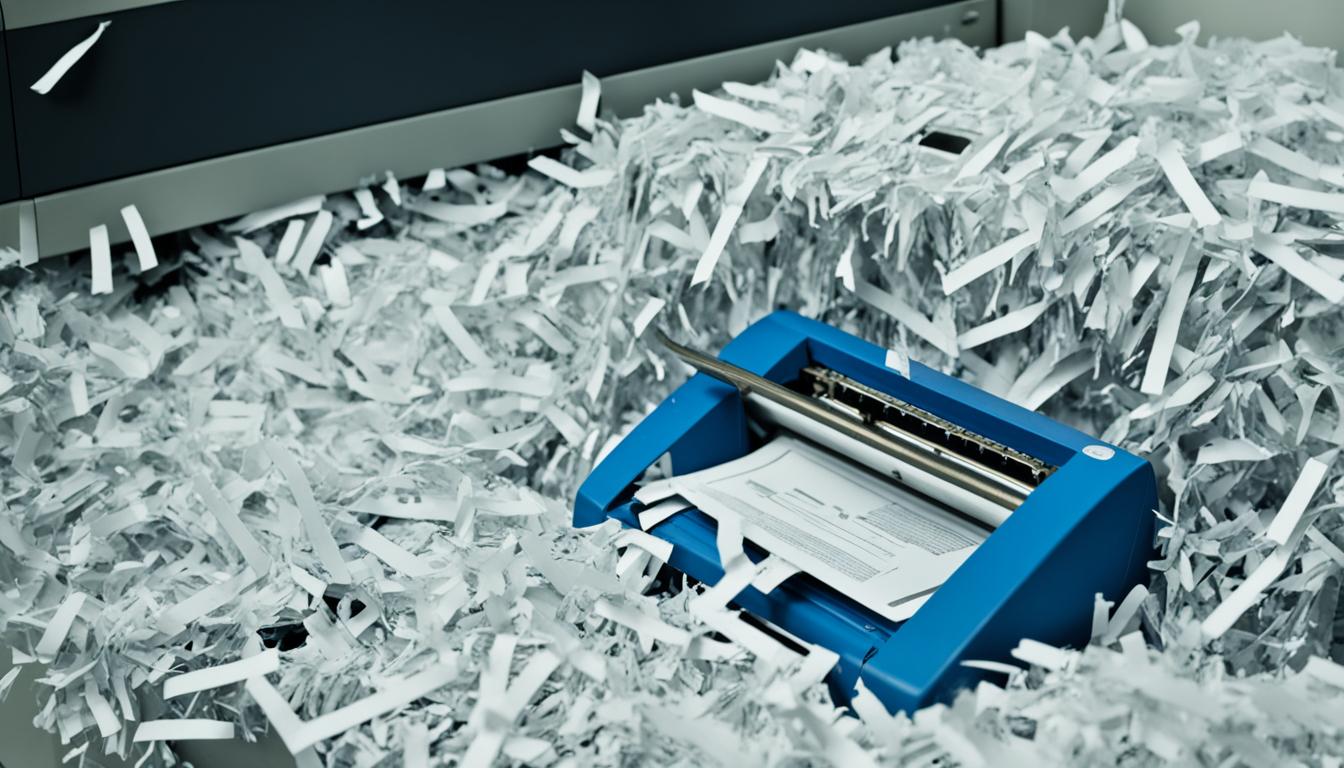Digital copiers, also known as digital multifunction devices, have become an essential tool in today's offices. They provide us with the convenience of copying, printing, scanning, faxing, and emailing documents with a simple press of a button. But have you ever wondered what happens to the documents once they are processed by the copier? Are they stored somewhere? Can the data be accessed by unauthorized individuals?
In this article, we will delve into the world of copier data security and explore the measures you can take to protect your sensitive information. From acquisition to disposal, we will guide you through the life-cycle of a copier, highlighting the crucial steps you need to take to ensure the safety of your documents. So, let's dive in!
Key Takeaways:
- Digital copiers store data about the documents they process, making it crucial to safeguard copier data.
- Proper data security measures should be in place throughout the copier's life-cycle, from acquisition to disposal.
- Securing the copier before acquisition involves including it in your organization's information security policies.
- Evaluate the data security features offered by manufacturers when purchasing or leasing a copier.
- Take advantage of all the built-in security features of your copier and securely dispose of the data it accumulates.
The Life-Cycle of a Copier
Copiers play a critical role in many organizations, facilitating document reproduction and enhancing productivity. However, it's important to understand that copiers go through a life-cycle where data security measures should be implemented at every stage.
Acquiring a Copier
When acquiring a copier, it is essential to take steps to secure it from the outset. Make sure to include copier security in your organization's information security policies and have it managed by your IT staff responsible for securing your computers and servers. Consider the copier's configuration to comply with information security policies, including securing its network connections.
Data Security Options for Purchase or Lease
Whether you choose to purchase or lease a copier, evaluating the data security options offered by manufacturers is crucial. Look for features such as encryption and overwriting that protect your data. Encryption encodes the data on the hard drive, while overwriting makes it more difficult to retrieve by changing the values of the bits on the disk. Take into account the copier's overwriting capabilities, including the number of times data is overwritten. Some copiers even allow locking the hard drives with a passcode for added security.
Using the Copier with Security in Mind
Once you have the copier in use, it is essential to make the most of all the available security features. Regularly and securely overwrite the entire hard drive to minimize the risk of data breaches. If your copier lacks built-in security features, consider integrating a secure copier into your information security plans. Use authentication methods, such as passwords or biometric information, to restrict physical access to the copier. Implementing software that requires proof of identity before printing, known as “pull printing” or “walk-up printing,” adds an extra layer of security. Utilize software that allows you to create print rules for specific printers and provides audit trails for accountability. Lastly, change the default network password to enhance overall security.
Secure Disposal of Copier and Data
When the copier reaches the end of its usable life, it is crucial to securely dispose of both the copier and the data it accumulated. Contact the manufacturer, dealer, or servicing company for options to secure the hard drive. Some companies will remove and return the hard drive, while others can assist in overwriting the data for you. Ensure your service contract includes proper data destruction. Please note that removing the hard drive on your own can render the copier inoperable; it is advisable to work with skilled technicians.
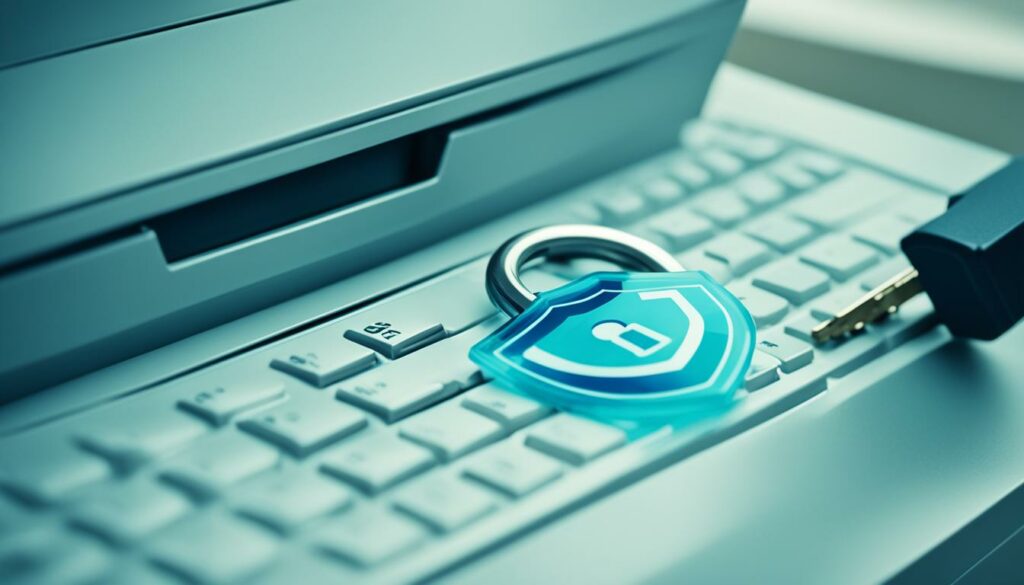
Securing copier data throughout its life-cycle is fundamental to protect your organization's sensitive information. By implementing robust data security measures from acquisition to disposal, you can minimize the risk of unauthorized access, data breaches, and potential legal consequences.
Securing Your Copier Before Acquisition
Before acquiring a copier, it is important to prioritize information security and ensure that it aligns with your organization's policies. This includes involving your IT staff, who are responsible for securing your computers and servers, in the management and maintenance of the copier. By considering the copier's configuration and network connections, you can ensure compliance with information security policies.
One essential step in securing your copier before acquisition is to have it included in your organization's information security policies and guidelines. This ensures that the copier is treated with the same level of security expectations as your other IT assets. By involving your IT staff, who are well-versed in managing and securing technology within your organization, you can leverage their expertise to implement robust security measures for the copier.
Here are some key considerations when securing your copier before acquisition:
- Ensure that the copier is part of your organization's information security policies and guidelines.
- Involve your IT staff in the management and maintenance of the copier.
- Review the copier's configuration to comply with information security policies.
- Secure the copier's network connections to prevent unauthorized access.
To illustrate this further, here is a visual representation of the key steps to secure your copier before acquisition:
| Steps to Secure Your Copier Before Acquisition |
|---|
| 1. Include the copier in your organization's information security policies and guidelines. |
| 2. Involve your IT staff in the management and maintenance of the copier. |
| 3. Review the copier's configuration to comply with information security policies. |
| 4. Secure the copier's network connections to prevent unauthorized access. |
Securing your copier before acquisition is a critical step in protecting your organization's sensitive information and ensuring compliance with information security standards. By proactively addressing security considerations during the acquisition process, you can mitigate the risk of data breaches and unauthorized access to confidential data.

Securing Your Copier During Purchase or Lease
When it comes to buying or leasing a copier, data security should be a top priority. Manufacturers offer various data security features that can help protect your confidential information. These features include encryption, overwriting, and hard drive locking capabilities. Evaluating these features before making a decision can ensure that your copier is equipped with the necessary safeguards to keep your data safe.
Encryption
Encryption is a fundamental security feature that encodes the data on your copier's hard drive. This encoding process makes the data unreadable without the specific software needed for decryption. By implementing encryption, you can effectively safeguard your sensitive information from unauthorized access, even if the hard drive falls into the wrong hands.
Overwriting
Overwriting is another critical data security feature to consider. This process involves changing the values of the bits on the disk by overwriting existing data with random characters. By doing so, it becomes increasingly difficult for anyone to retrieve previously stored information. When assessing copiers, take note of the number of times data is overwritten, as multiple passes can provide a higher level of data protection.
Hard Drive Locking
Some copiers offer the option to lock the hard drives using passcodes. This feature adds an additional layer of protection, as it ensures that even if the hard drive is physically removed from the copier, the data remains inaccessible. Implementing hard drive locking capabilities can help safeguard your data against potential theft or unauthorized retrieval.
By carefully evaluating the data security features offered by manufacturers, you can make an informed decision when purchasing or leasing a copier. It is crucial to choose a copier that provides encryption, overwriting, and hard drive locking capabilities to protect your confidential information from falling into the wrong hands.
Take a look at the table below for a comparison of different copier data security features:
| Copier Model | Encryption | Overwriting | Hard Drive Locking |
|---|---|---|---|
| Brand A | Yes | 3 times | No |
| Brand B | Yes | 7 times | Yes |
| Brand C | No | N/A | Yes |
Note: The table above is a hypothetical comparison to illustrate the differences in data security features offered by different copier brands. It is essential to consult with copier manufacturers and review their specific product offerings to make an informed decision based on your organization's data security needs.
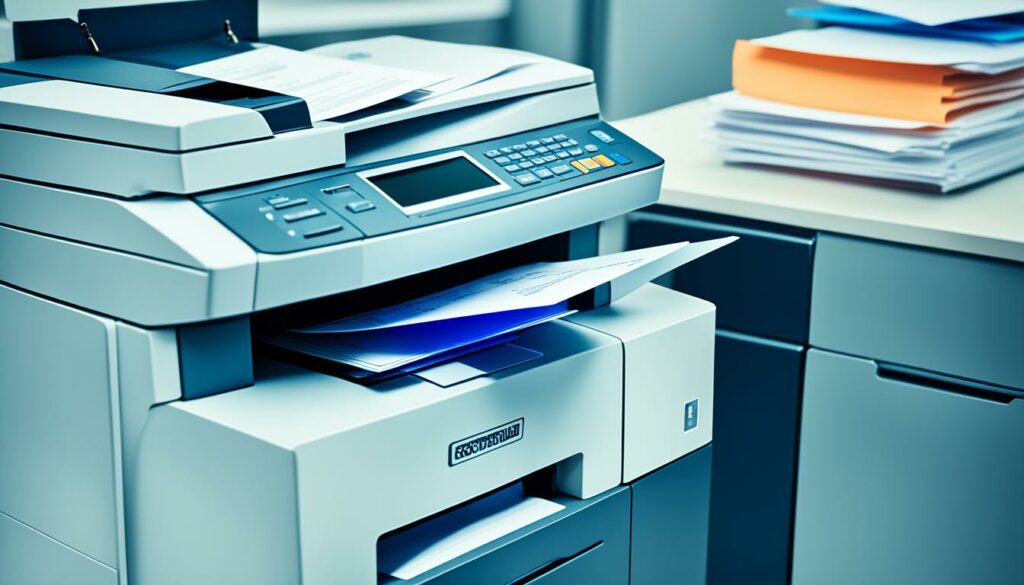
Securing Your Copier During Use
When it comes to copier data security, it is crucial to make the most of the security features offered by your copier. By taking proactive steps, you can ensure the confidentiality and integrity of your sensitive information. Here are some key measures to consider:
- Securely overwrite the entire hard drive: Regularly overwrite the data stored on your copier's hard drive to prevent unauthorized access. Aim to perform a secure overwrite at least once a month to minimize the risk of data breaches.
- Integrate a secure copier: If your current copier does not have built-in security features, it may be time to consider integrating a secure copier into your information security plans. Look for copiers with robust data protection measures to safeguard your confidential data.
- Implement authentication methods: Enhance physical access security by requiring authentication methods such as passwords or biometric information. This ensures that only authorized individuals can access the copier and its data.
- Consider “pull printing” or “walk-up printing” software: Implement software solutions that require proof of identity before printing. This adds an extra layer of security, ensuring that sensitive documents are released only to authorized individuals.
- Use software to create print rules: Restrict access to specific printers by implementing print rules through software. This adds granularity to your access control measures and provides audit trails for accountability.
- Change default network passwords: Enhance network security by changing the default password of your copier's network connection. This helps protect against unauthorized access and reinforces data security.
By implementing these security measures, you can significantly reduce the risk of copier data breaches and protect your valuable and sensitive information.
Securing Your Copier After Use
Once you have finished using your copier, it is crucial to take steps to ensure the secure disposal of the data it has accumulated. Proper disposal is essential to prevent unauthorized access to sensitive information and protect your organization from potential data breaches. Here are some important measures to consider:
- Check with the manufacturer, dealer, or servicing company for options to secure the hard drive. Some companies offer services to remove and return the hard drive, while others may provide data overwriting services.
- Ensure your service contract includes proper data destruction procedures to guarantee the complete removal of all stored information.
- It is advisable to work with skilled technicians when handling copier hard drives, as removing the hard drive on your own can render the copier inoperable or result in data recovery risks.
To give you a visual representation of the importance of copier data disposal, here's a comparison of copier hard drive security measures:
| Security Measures | Pros | Cons |
|---|---|---|
| Manufacturer/Dealer Service for Hard Drive Removal | Ensures the physical removal of the hard drive, minimizing the risk of data recovery | Additional cost; may require sending the copier off-site for servicing |
| Data Overwriting Services | Cost-effective option to securely overwrite data on the hard drive | Requires professional assistance; may not be suitable for all copier models |
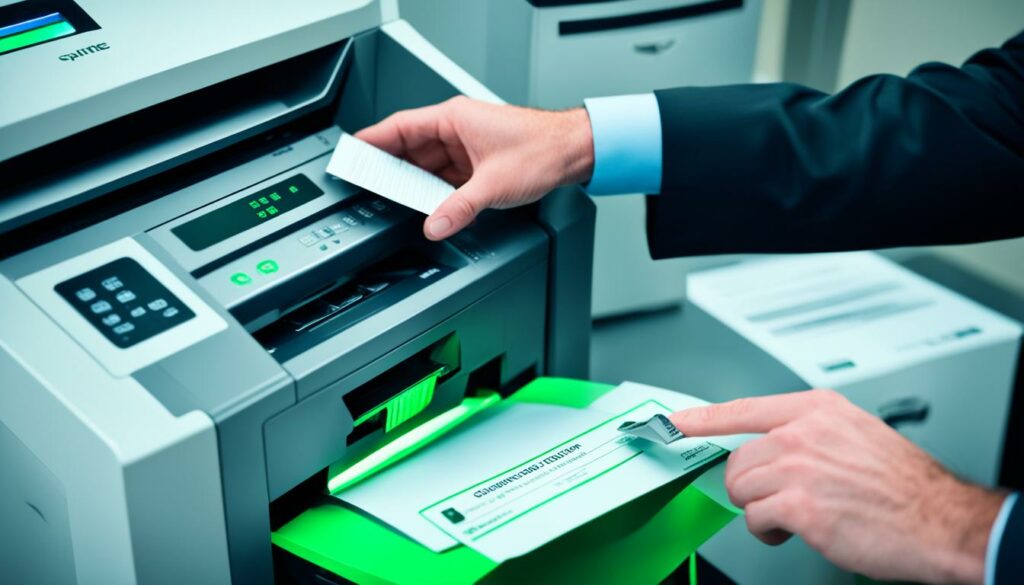
By following these measures and ensuring proper copier data disposal, you can effectively mitigate the risk of data breaches and protect the confidentiality of sensitive information. Remember that data security is an ongoing commitment, and regularly reviewing and updating your copier security practices is essential for maintaining a robust information security framework.
Legal Responsibility for Protecting Sensitive Information
Protecting sensitive information stored on copiers is a legal responsibility for businesses. The Federal Trade Commission (FTC) has established standards for information security, which require companies to implement reasonable procedures to protect sensitive information. Compliance obligations can vary depending on the type of information stored, received, or transmitted by the business.
Companies must adhere to compliance regulations to ensure copier data security and information security compliance.
Specific compliance regulations, such as the Disposal Rule or the Gramm-Leach-Bliley Safeguards Rule, may impose requirements for proper data disposal and the implementation of comprehensive security plans for copiers. These regulations aim to safeguard sensitive information from unauthorized access and misuse.
FTC's Standard for Information Security
The FTC's standard for information security emphasizes that companies must take reasonable steps to protect sensitive information. These steps include:
- Implementing strong access controls to restrict unauthorized access
- Maintaining up-to-date security software and systems
- Regularly monitoring systems for potential security breaches
- Providing proper training to employees on information security best practices
“Compliance with information security regulations and the adoption of robust data protection measures are essential to ensure the privacy and security of sensitive information stored on copiers.”
Compliance with Copier Data Security Regulations
Companies need to be aware of the specific compliance obligations related to the protection of copier data. These obligations may include:
- Developing and implementing policies and procedures to secure copier data
- Establishing strict access controls, such as passwords or biometric authentication
- Regularly assessing the security measures in place and making necessary updates
- Creating a comprehensive incident response plan to address potential data breaches
By ensuring compliance with these regulations, businesses can minimize the risk of copier data breaches and demonstrate their commitment to protecting sensitive information.
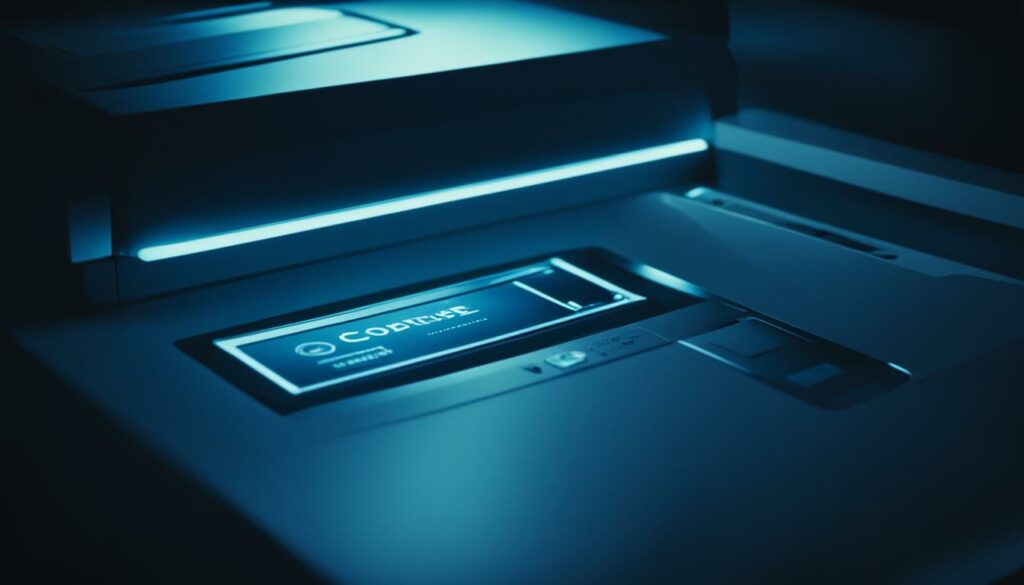
CBS News Investigation Reveals Copier Data Risk
A CBS News investigation has shed light on the alarming risks associated with copier data theft. It has been revealed that almost every digital copier built since 2002 contains a hard drive that stores images of all the documents that have been copied, scanned, or emailed by the machine. This includes highly sensitive and personal data such as social security numbers, birth certificates, bank records, and medical records. Shockingly, the investigation found that used copiers stored in warehouses contained confidential information that could easily be accessed and downloaded.
To emphasize the gravity of the situation, here is an image of a copier's hard drive which stores such data:
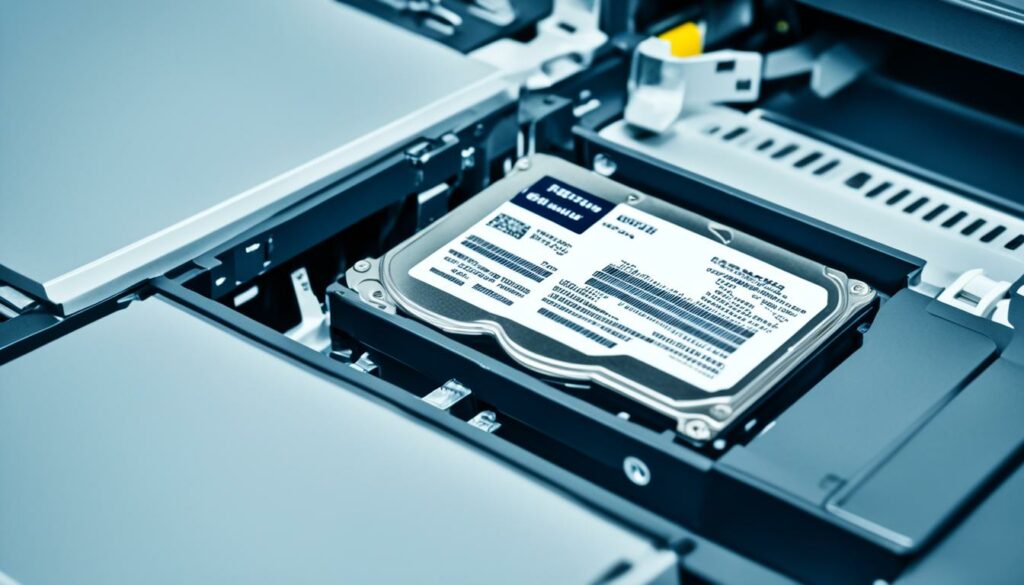
“Nearly every digital copier built since 2002 contains a hard drive that stores images of all the documents copied, scanned, or emailed by the machine.”
This CBS News investigation serves as a stark reminder of the security risks associated with copiers. The copier data stored on these hard drives can be highly valuable to potential attackers, leaving individuals and organizations vulnerable to various forms of identity theft, fraud, and information leakage. It is imperative that businesses take immediate action to address these risks and implement robust data security measures to protect sensitive information.
Examples of Copier Data Breaches
The CBS News investigation revealed alarming examples of copier data breaches. These incidents highlight the potential impact of copier data breaches on individuals' lives, as highly sensitive and personal information can easily be accessed and compromised. Take a look at some of the shocking examples below:
-
Detailed domestic violence complaints
-
Lists of wanted sex offenders
-
Sensitive construction plans
-
Pay stubs with personal information
-
Medical records
These examples serve as a stark reminder of the urgency in implementing robust security measures to protect sensitive data stored on copiers. The potential exposure of such sensitive information highlights the importance of data protection for both individuals and organizations.
To provide a visual representation of the severity of these breaches, take a look at the image below:
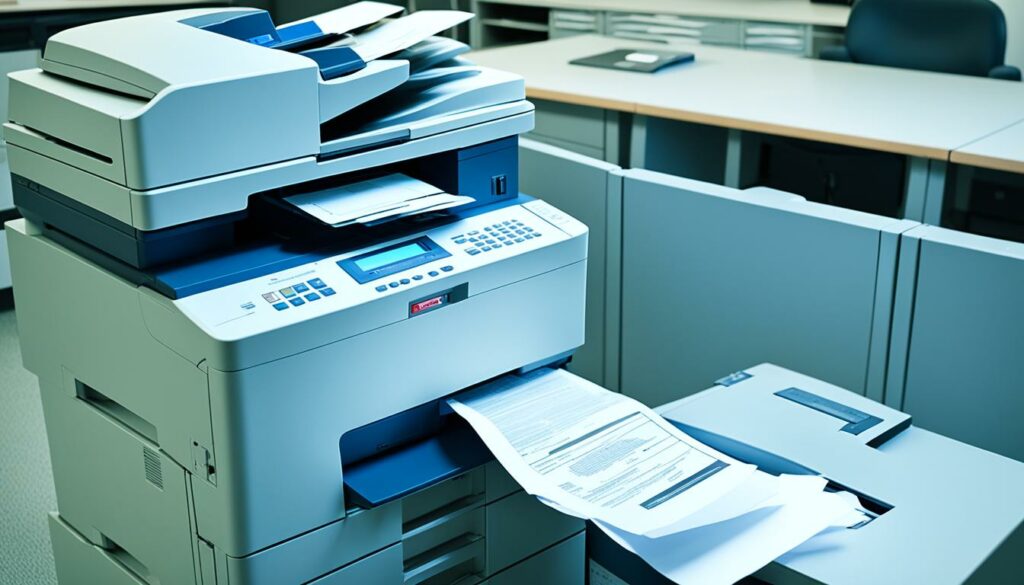
The image serves as a poignant reminder of the need for greater awareness and action when it comes to copier data security. The consequences of inadequate measures can be devastating, underscoring the urgent need for enhanced protection and vigilance.
Industry Failure to Inform the Public
The copier industry has a responsibility to inform the general public about the risks associated with copier data storage. However, a survey conducted by a reputable copier company revealed that a significant number of Americans remain unaware of this potential threat. Shockingly, 60% of respondents admitted to being unaware that copiers store images on a hard drive. This lack of awareness, coupled with the perceived insignificance of copier data security, has left copiers vulnerable to breaches and has hindered investment in protective measures.
Measures to Secure Copier Data
Despite the industry's failure to address the issue, organizations can take proactive measures to ensure the security of their copier data. By implementing a combination of network security, physical security measures, disk encryption, automatic data wiping, and consulting service providers for additional safeguards, businesses can effectively protect their sensitive information. While some security features may come at a cost, the investment is necessary to safeguard valuable data from unauthorized access and potential breaches.
Network Security
Securing the network connections of copiers is essential to prevent unauthorized access to data. Ensure that the copier is connected to a secure network and implement measures such as firewalls, encryption protocols, and strong passwords to restrict access to the device and its stored data. Regularly update network security software and apply patches to prevent vulnerabilities that could be exploited by hackers.
Physical Security Measures
Implementing physical security measures around the copier can protect against unauthorized access. Ensure that the copier is located in a secure area with limited access. Consider using surveillance cameras, access control systems, and secure cabinets or enclosures to prevent physical tampering or theft of the device and its hard drive.
Disk Encryption
Utilizing disk encryption is crucial to protect the data stored on a copier's hard drive. Encryption encodes the stored information, making it unreadable without the appropriate decryption software or key. This adds an extra layer of security, ensuring that even if the hard drive falls into the wrong hands, the data remains inaccessible.
Automatic Data Wiping
Enabling automatic data wiping on a copier's hard drive helps to ensure that sensitive information is permanently deleted. Automatic data wiping can be configured to overwrite the stored data with random characters, making it virtually impossible to recover. Regularly schedule automatic data wiping to minimize the risk of data breaches.
Consulting With Service Providers
Consulting with copier service providers can provide additional safeguards to secure copier data. Service providers may offer services such as secure data disposal, hard drive removal and return, or validation of proper data destruction. Collaborating with experts in copier data security ensures that organizations are taking all necessary precautions to protect their sensitive information.
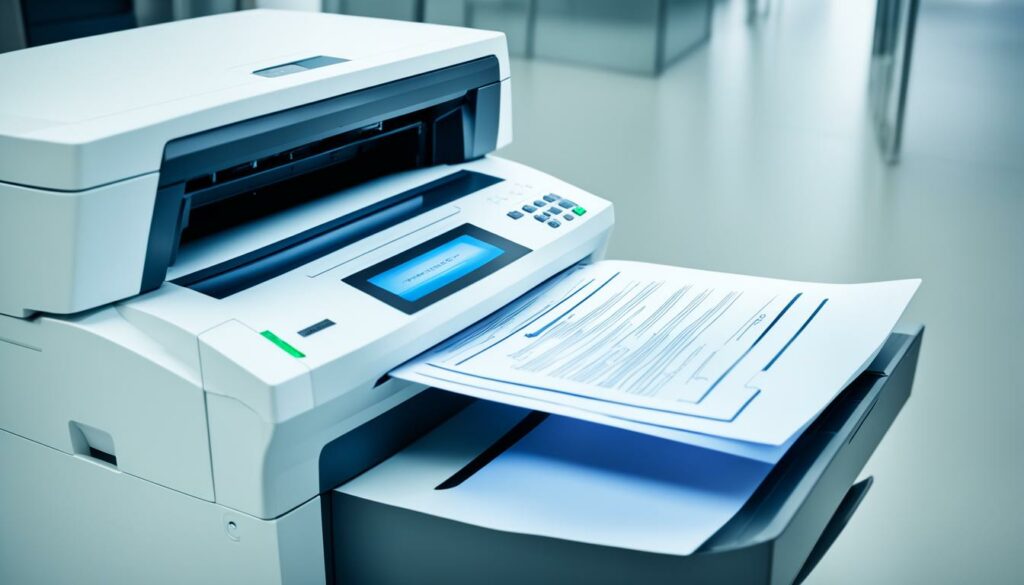
| Security Measures | Description |
|---|---|
| Network Security | Implement firewalls, encryption protocols, and strong passwords to secure network connections. |
| Physical Security Measures | Ensure copier is located in a secure area with limited access, utilize surveillance cameras, access control systems, and secure cabinets or enclosures. |
| Disk Encryption | Utilize encryption to encode stored data, protecting it from unauthorized access. |
| Automatic Data Wiping | Schedule automatic data wiping to permanently delete sensitive information by overwriting stored data with random characters. |
| Consulting with Service Providers | Work with service providers to ensure secure data disposal, hard drive removal, and validation of proper data destruction. |
Conclusion
Protecting copier data is a critical aspect of overall information security. It is essential for organizations to proactively secure copiers at every stage of their life-cycle to safeguard sensitive information and meet legal responsibilities.
By implementing robust data security measures and leveraging available security features, businesses can significantly reduce the risk of copier data breaches. It is crucial to raise awareness among employees about the importance of data protection and train them on best practices to minimize vulnerabilities.
Organizations must recognize their legal responsibility to protect confidential information stored on copiers. Investing in cost-effective solutions that prioritize privacy and security is a necessary step towards ensuring the integrity of sensitive data. By taking these measures, businesses can safeguard their reputation, avoid potential legal consequences, and maintain the trust of their clients and customers.

I'm Morgan, the creator of VPNForMe — a site born from too many hours spent side-eyeing sketchy VPN reviews and buffering videos.
I wanted a place where people could get straight answers about privacy, streaming access, and which VPNs actually deliver — without the hype or tech jargon.

